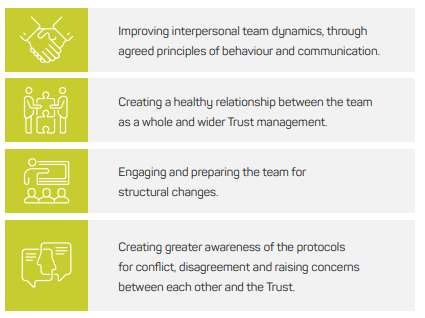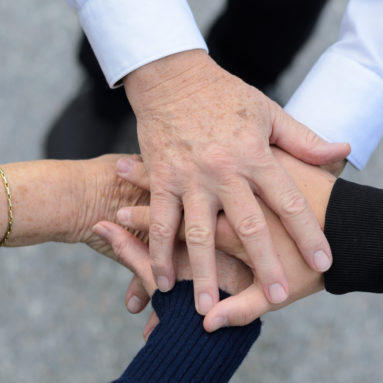

Download this case study


Read more case studies:
Providing Stability to a Surgical Team
Introduction
A vital NHS Trust provides diagnostic, medical and surgical care to the people of a region in England throughout all stages of life – from neonatal to the elderly. With over 13,000 staff combined, the hospital delivers more than 100 clinical services, some of which specialise in children, cardiac and cancer. The Trust is dedicated to helping others, seen as a beacon for outstanding education, research and innovation.
Understanding pressures
In 2019, the Trust issued a tender for an organisation to provide support to a surgical unit. An undercurrent of sub-optimal team dynamics was present within the team of highly specialised surgeons, working in the most complex and intense environments on a daily basis. The team had been under investigation, with several members absent and/or suffering with mental health pressures due to grievances raised against them. The team had been assessed as not functioning in accordance with the organisation’s values and principles, causing a severe breakdown in interpersonal relationships and a strained working atmosphere.
The existing HR team within the organisation had developed a clear pathway for support. This involved:
- The creation of a shared behavioural framework through team facilitation
- Personality type assessments to create awareness of different styles within the team and the impact this could have on capability to collaborate
- Management development
- A programme of service optimisation
The TCM Group’s approach to courageous and compassionate leadership reflected this and successfully won the bid to complete this phased programme for team development. It was crucial to be empathetic to the unique pressures of this particular case, involving those entrusted with the power to save lives. Striking a balance between performance and positivity was the ultimate task for TCM.
Building bonds
The first phase of TCM intervention was to undertake a period of discovery in which team members and key stakeholders were interviewed. Following learnings from this, a programme was aligned and designed alongside coaching for four team members. These sessions aimed to create greater awareness of individual perspectives and an appreciation for the impact and responsibilities each member has in the team. A senior member had been absent from the team, impacting team capability and causing wide apprehension about their return to work. Management felt the need to gently govern the return to ease nerves and engage team members. An emphasis on a smooth and successful transition was highlighted as it coincided with the introduction of a new team structure.
As such, the programme focused on:

Providing stability
Two team facilitation workshops have created momentum for the team to work together more effectively with shared goals for providing high quality service through mutual collaboration. A meeting has been facilitated to share details of the new structure and several workstreams are planned to implement service optimisation.
- Since undergoing TCM’s bespoke programme, the following impacts were delivered:
- A more productive team relationship
- A greater sense of trust between team members
- Embodiment of behaviours associated with a positive mindset
- Understanding and working with personality difference
- A reduced impact of poor communication
- Better management of conflict within and outside the team
- Better management of personal pressure and anger
- An understanding of consequences if behavioural expectations are not met
An agenda of positive stability became the new foundation of the team. Implementing a formalised behavioural contract, rigid protocols and a transparent, succession planning model of leadership was vital – but doing so with collaborative, compassionate and communicative behaviours built to withstand inevitable pressures. With a renewed commitment to conduct, the team could get back to what was really important: saving lives











